Compared to other Asian countries, South Korea is considered to have a very rapidly developing relationship with Vietnam over the past three decades. The two countries established diplomatic relations at the ambassadorial level in 1992, upgraded to a comprehensive partnership in 2002, and developed into a strategic cooperative partnership in 2009. In 2017, with the "New Southern Policy" of President Moon Jae-in's administration, South Korea chose Vietnam as a central hub, becoming a gateway for South Korea to Southeast Asian countries. Vietnam maintains diplomatic relations with over 200 countries but has only established strategic cooperative partnerships with 17, with South Korea being one of the first three countries with which Vietnam established a strategic partnership in 2009. Currently, South Korea has been the largest foreign investor in Vietnam for many consecutive years. Vietnam is South Korea's third largest trading partner. The two countries also aim to increase bilateral trade to $100 billion by 2020, accounting for 50% of ASEAN-Korea trade. In recent meetings, leaders of both countries have mentioned upgrading diplomatic relations to a Comprehensive Strategic Partnership, considering each other as top priority partners. The achievements in cooperation between the two countries to date are thanks to the commitments and positive policies from both governments; and also demonstrate a favorable cooperation environment with much untapped potential.
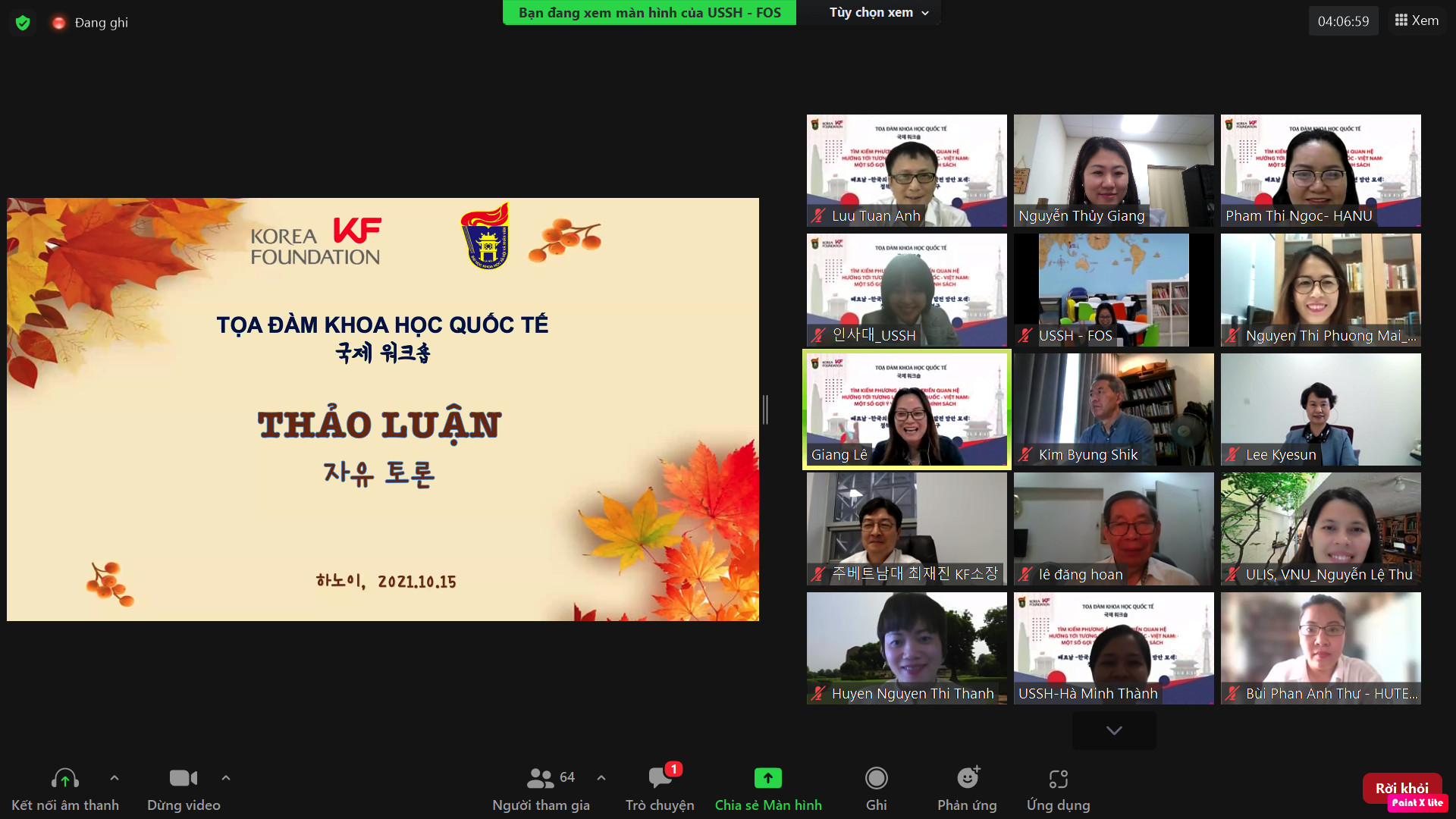
Discussing the importance and positive contributions of Korean Studies in Vietnam to the development of cooperative relations between the two countries, Dr. Luu Tuan Anh (Faculty of Oriental Studies, University of Social Sciences and Humanities, Vietnam National University, Hanoi) shared the following information: Korean Studies in Vietnam was established almost simultaneously with the official establishment of diplomatic relations between the two countries. To date, Vietnam has 35 institutions providing training in Korean language and related fields of Korean Studies. Over the past nearly 30 years, these institutions have trained thousands of graduates who are proficient in Korean and possess solid knowledge of Korea, working in various types of agencies and businesses. However, as the relationship between the two countries develops to a higher level, issues related to specialized fields such as law, science and technology, health, and environment have emerged, alongside traditional areas of cooperation such as economics, culture, and society. Many fields require comprehensive knowledge of Korean studies to address issues arising during exchanges and cooperation. Therefore, Korean language training institutions in Vietnam are increasingly expanding into specialized training in country studies with a comprehensive, interdisciplinary, and regional studies-oriented approach. Korean studies in Vietnam face the crucial responsibility of closely following development realities, linking with diverse key industries and sectors to support bilateral relations, minimizing conflicts and disagreements, and maximizing the strengths of each side in cooperative relationships.
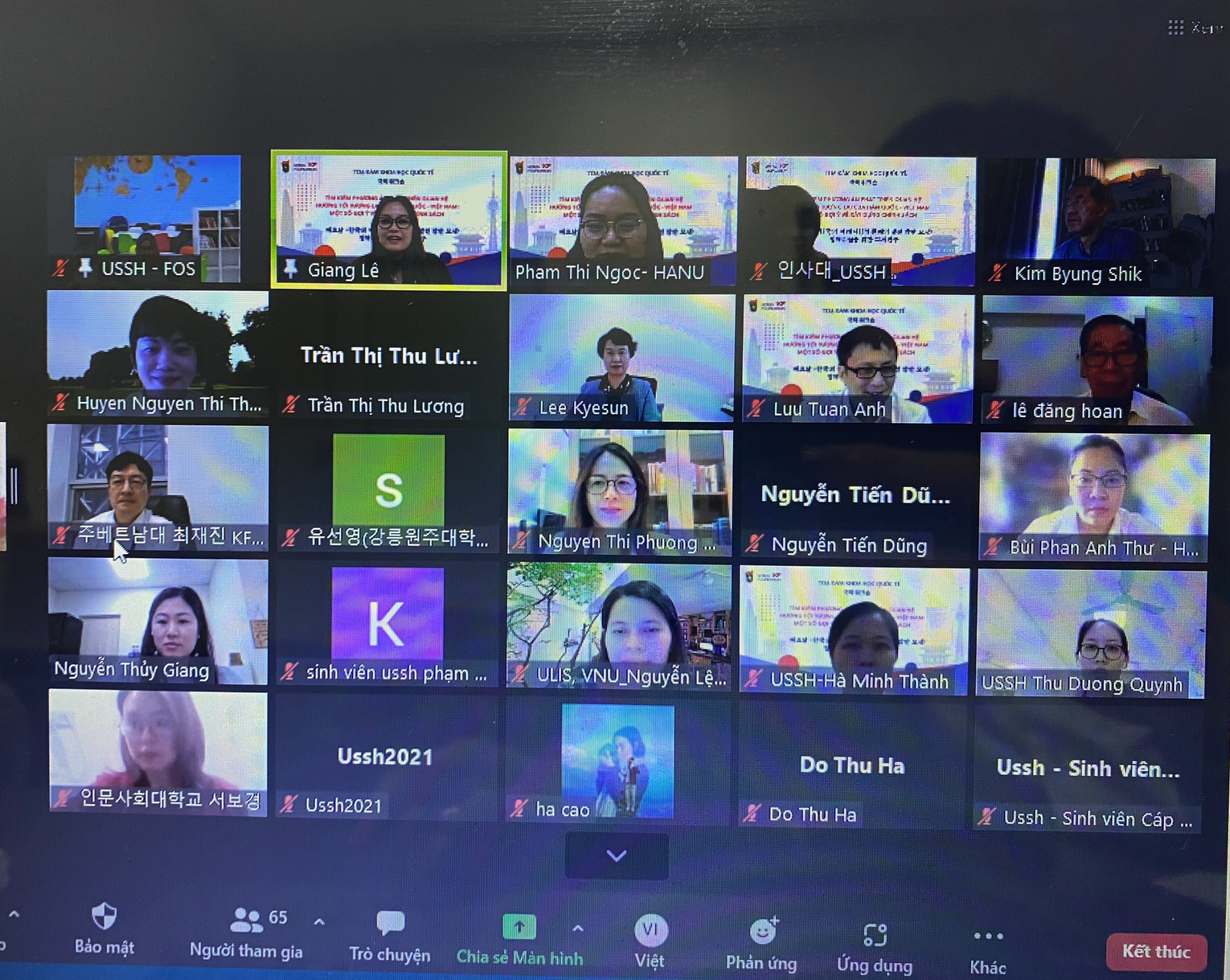
Associate Professor Tran Thi Thu Luong (Hong Bang International University) proposed enhancing the quality of South Korea-Vietnam cooperation by promoting the development of Korean studies in Vietnam in line with modern regional studies. The scientist noted that the achievements of Korean studies in Vietnam are mainly reflected in three aspects: popularizing the Korean language and increasing Vietnamese people's understanding of Korea; gradually developing Korean studies in various fields such as economics, culture, and history to draw lessons for Vietnam; and training a team of researchers and lecturers on Korean studies in Vietnam. From there, Associate Professor Tran Thi Thu Luong outlined several activities for Korean studies in line with modern regional studies and linked to Vietnam-Korea relations, including: increasing interdisciplinary collaboration to form a reliable database for Korean investment activities in Vietnam; conducting comparative studies of Vietnamese and Korean cultural spaces at the family, local, regional, and national levels for multicultural families; Place Korean studies within a regional and international context.
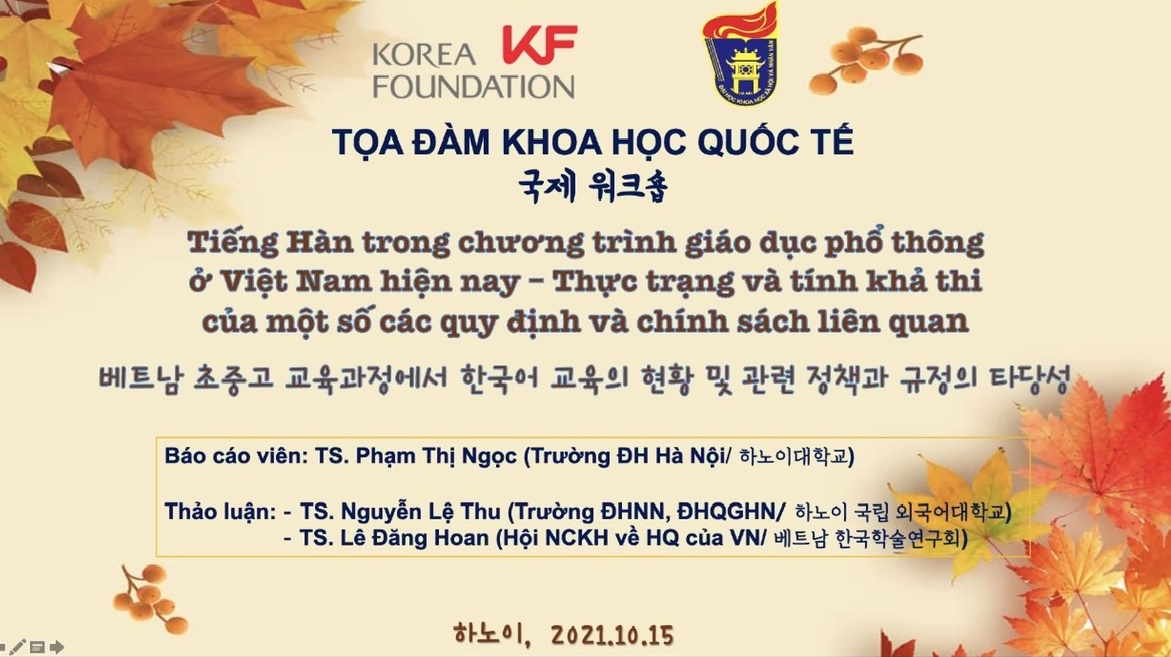
Discussing the changes in South Korea's international development cooperation with Vietnam through ODA (Official Development Assistance), Dr. Lee Kye-sun (Thang Long University) recalled South Korea's "Miracle on the Han River" in leveraging ODA from the international community to transform from a post-war impoverished nation into a developed country with significant economic and political standing in the world. Currently, South Korea maintains top priority in ODA support for Vietnam, focusing on increasing investment in areas where Vietnam is concentrating on reforms: public administration, education, environment, health, human resources, information technology, etc. A key highlight of this shift in South Korea's international development cooperation with Vietnam through ODA is the gradual move from a support-oriented approach to a development-oriented cooperation approach. However, Vietnam also needs to be cautious in using ODA effectively and addressing the issue of slow disbursement.

Regarding the issue of "Social Cooperation between Vietnam and Korean Non-Governmental Organizations," Dr. Nguyen Thi Tham (Institute for Northeast Asian Studies) stated that along with the rapid development of diplomatic and economic relations, cooperation in social relations between the two countries is increasingly being strengthened. The number of Korean non-governmental organizations (NGOs) in Vietnam is constantly increasing with diverse activities, actively contributing to solving social problems in Vietnam. The value of projects and programs of KNGOs in Vietnam has also increased significantly in the last 10 years, focusing on socio-economic development, community development, rural development, livelihood support, and support for vulnerable groups. The Vietnamese government also gives KNGOs special attention and priority.
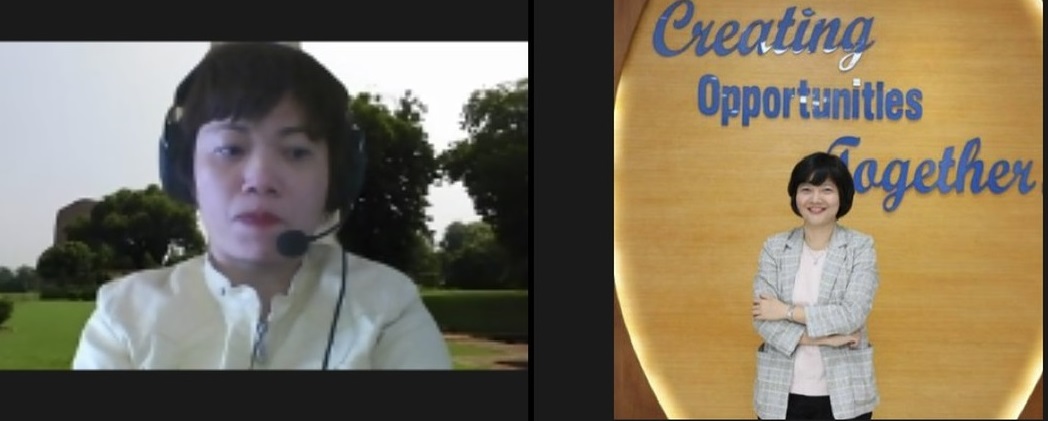
However, Dr. Nguyen Thi Tham also pointed out that a prominent characteristic of KNGOs in Vietnam is that most of them follow a direct cooperation approach with local governments. KNGO activities are primarily humanitarian and charitable rather than development support activities. Compared to cooperation in other fields, cooperation in the social sector between Vietnam and South Korea is still not commensurate with the strategic relationship between the two countries. In addition, issues such as the environment, sustainable development, legal assistance, and capacity building also need to be addressed and expanded through cooperation by KNGOs.
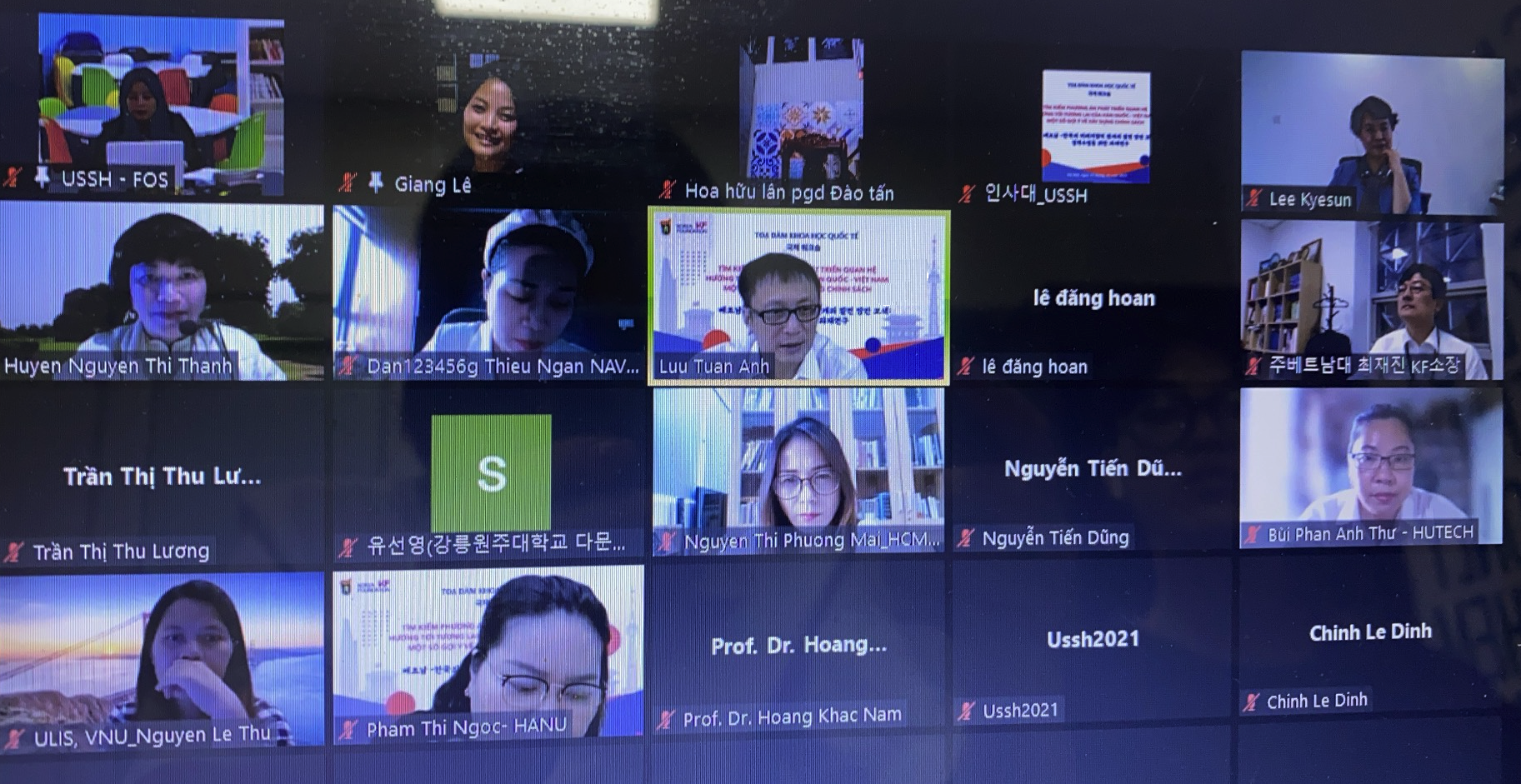
The presentation "Research on Cooperation Issues in Economic and Trade Aspects between Vietnam and South Korea" by Mr. Chu Van Tu (Korea Chamber of Commerce and Industry) delves into South Korea's experience in developing a creative economy, thereby offering policy suggestions to promote the creative economy in Vietnam, creating a foundation for cooperation between the two countries.
To make Vietnam a destination for innovation, the author proposes solutions such as: improving the operational mechanisms of the state management apparatus for science and technology; placing businesses at the center of innovation activities; increasing investment in infrastructure and innovation networks; increasing financial investment in technological innovation and innovation; developing human resources in science, technology and innovation; and forming and nurturing an innovation culture in each individual and organization…
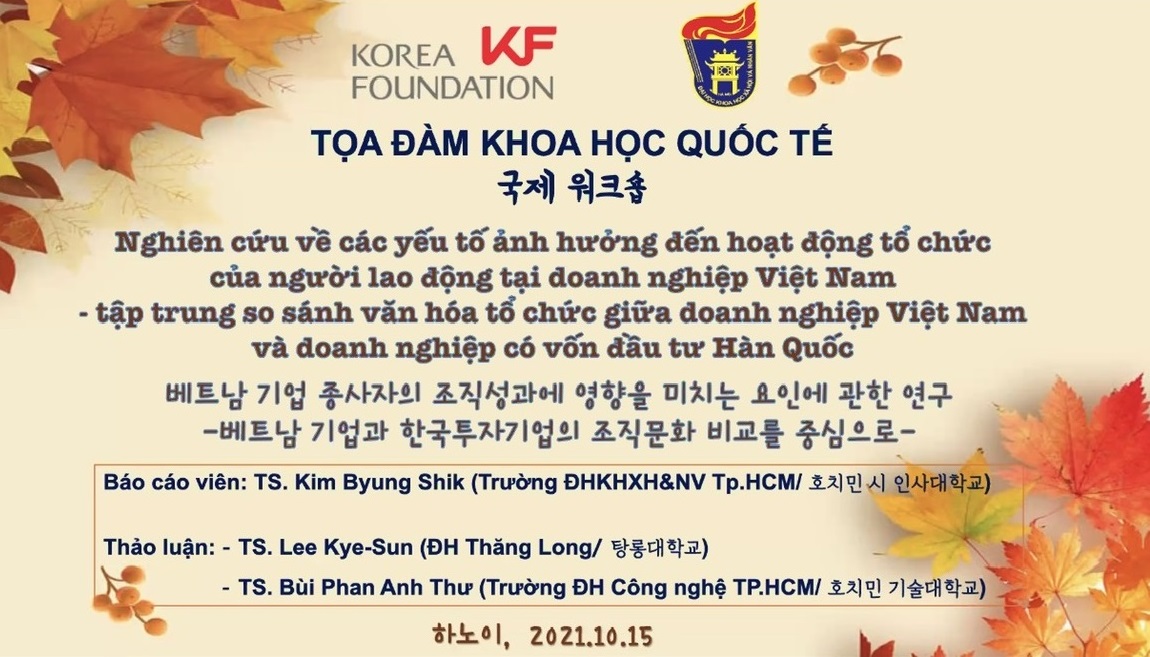
From a cultural perspective, Associate Professor Dr. Nguyen Thanh Huyen (Institute of Journalism and Communication Training, University of Social Sciences and Humanities) raises the question: Although cultural cooperation between Vietnam and South Korea has been quite vibrant recently, is this cooperation proportionate and balanced? With its stronger potential, South Korea tends to export cultural products to Vietnam in a one-way manner, with few official collaborative projects between the two countries in music, film, etc. Meanwhile, the quality of cooperative relations lies in the balance and equality of benefits achieved by both sides. An imbalance in the relationship will lead to one side being at a disadvantage or dominating the other, causing negative consequences and conflicts…
Associate Professor Dr. Nguyen Thanh Huyen also believes that the focus of the cultural industry is the production of creative content, and this could be an opportunity and prospect for future cooperation between the two countries. While South Korea's creative content industry has achieved remarkable success based on the accumulation of state policies and laws; the agility in seizing investment opportunities; and the systematic, professional, and in-depth expertise of its workforce, this activity in Vietnam is still quite young. However, the prerequisites for cooperation have begun to emerge. South Korea has one of the largest creative content industries in the world, and Southeast Asia is its fourth largest market. The presence of KOCCA – the Korea Creative Content Agency – in Vietnam is an important support in connecting businesses from both sides, opening up opportunities for cooperation in this field. So, is Vietnam ready to seize the opportunity to break through in this promising sector? While South Korea is actively seeking cooperation opportunities in Vietnam, Vietnamese cultural management agencies need to proactively understand the strengths and experiences of their South Korean counterparts to develop policies that support their own businesses. It is crucial to create leverage to enable Vietnam's creative content industry to achieve equal and mutually beneficial cooperation with South Korea.
Author:Ha Le
Newer news
Older news